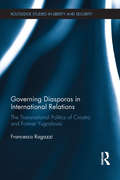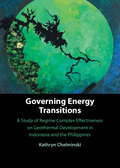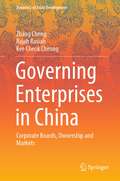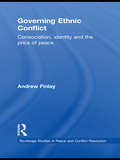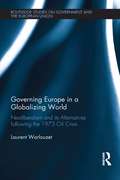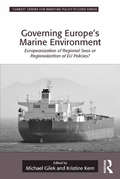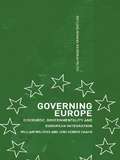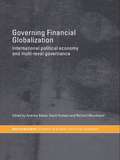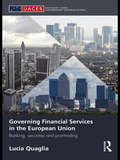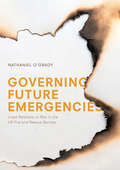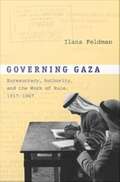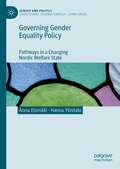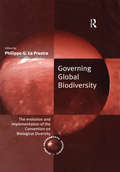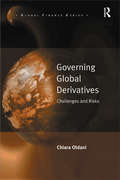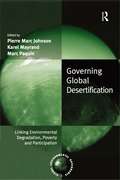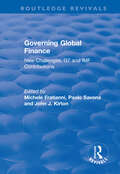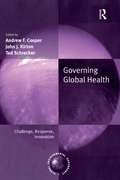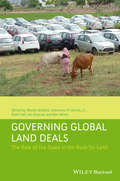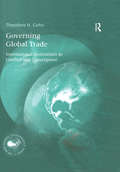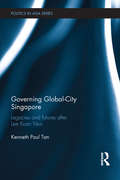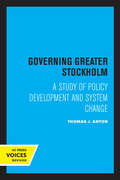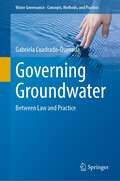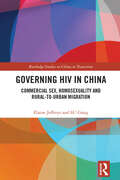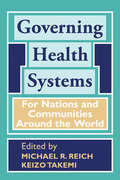- Table View
- List View
Governing Diasporas in International Relations: The Transnational Politics of Croatia and Former Yugoslavia (Routledge Studies in Liberty and Security)
by Francesco RagazziThis book analyzes how states extend their sovereignty beyond their territories through the language of diasporas. An increasing number of states are interested in supporting, managing or controlling their populations abroad, something they define as their ‘diaspora’. Yet what does it mean for governments to formulate claims of sovereignty over populations who reside outside the very borders that legitimate them? This book argues that ‘diaspora’ should be understood as a performative discourse that enables transnational political practices that could otherwise not be justified in a normative structure of world politics, dominated by the imperatives of territorial sovereignty. The empirical analysis focuses on the former Yugoslavia and contemporary Croatia. The first part of the book examines the history of the relations between Croats abroad and their homeland, from the emergence of the question of emigration as a problem of government in the late nineteenth century until the years preceding the formation of the contemporary Croatian state. The second part explores how, in the 1990s, the merging of bureaucratic categories and state practices into the category of ‘diaspora’ was instrumental in mobilizing Croats abroad during the 1991-1995 war; in reshuffling the balance between Serbs and Croats in the citizenry; and in the de facto annexation of parts of neighboring Bosnia-Herzegovina in the immediate aftermath of the war. This book will be of much interest to students of critical security studies, international political sociology, diaspora studies, border studies, and International Relations in general.
Governing Energy Transitions: A Study of Regime Complex Effectiveness on Geothermal Development in Indonesia and the Philippines
by Kathryn ChelminskiAs the world moves with increasing urgency to mitigate climate change and catalyze energy transitions to net zero, understanding the governance mechanisms that will unlock barriers to energy transitions is of critical importance. This book examines how the clean energy regime complex-the fragmented, complex sphere of governance in the clean energy issue area characterized by proliferating and overlapping international institutions-can be effective in fostering energy transitions at the domestic level, particularly in emerging market and developing economies (EMDEs). Through comparative case studies of geothermal development in Indonesia and the Philippines, the chapters provide two different tales of energy transitions, demonstrating how domestic factors have hindered or facilitated progress. This book will be useful for students, researchers, and practitioners working in international relations, energy politics, political science, development studies, public policy, international law, and sociology. This title is also available as Open Access on Cambridge Core.
Governing Enterprises in China: Corporate Boards, Ownership and Markets (Dynamics of Asian Development)
by Rajah Rasiah Kee Cheok Cheong Zhang ChengThis book examines the nature of the marketization of corporate boards following the introduction of the split share reform, corporate board and shareholder relations, corporate performance, and risk-taking conduct in China. The chapters cover topics such as determinants of corporate board size and independence, corporate risk-taking conduct under different controlling shareholder types. The book deepens our understanding of corporate governance mechanisms as most previous studies have limited their findings using mainstream perspectives grounded on neoclassical theory. It outlines that China’s corporate board composition is determined by the board’s scope of operation, monitoring, bargaining power, and other governance mechanisms and regulations. It also offers a comparison between China’s experience with other economies in general and other transition economies in particular. As such, the book represents an essential overview of the current concerns regarding corporate governance in China. It is of great interest to legal researchers, policymakers, and legal practitioners working with business investments in China.
Governing Ethnic Conflict: Consociation, Identity and the Price of Peace (Routledge Studies in Peace and Conflict Resolution)
by Andrew FinlayThis book offers an intellectual history of an emerging technology of peace and explains how the liberal state has come to endorse illiberal subjects and practices. The idea that conflicts are problems that have causes and therefore solutions rather than winners and losers has gained momentum since the end of the Cold War, and it has become more common for third party mediators acting in the name of liberal internationalism to promote the resolution of intra-state conflicts. These third-party peace makers appear to share lessons and expertise so that it is possible to speak of an emergent common technology of peace based around a controversial form of power-sharing known as consociation. In this common technology of peace, the cause of conflict is understood to be competing ethno-national identities and the solution is to recognize these identities, and make them useful to government through power-sharing. Drawing on an analysis of the peace process in Ireland and the Dayton Accords in Bosnia Herzegovina, the book argues that the problem with consociational arrangements is not simply that they institutionalise ethnic division and privilege particular identities or groups, but, more importantly, that they close down the space for other ways of being. By specifying identity categories, consociational regimes create a residual, sink category, designated 'other'. These 'others' not only offer a challenge to prevailing ideas about identity but also stand in reproach to conventional wisdom regarding the management of conflict. This book will be of much interest to students of conflict resolution, ethnic conflict, identity, and war and conflict studies in general. Andrew Finlay is Lecturer in Sociology at Trinity College Dublin.
Governing Europe in a Globalizing World: Neoliberalism and its Alternatives following the 1973 Oil Crisis (Routledge Studies on Government and the European Union)
by Laurent WarlouzetThe complex relationship between globalization and European integration was largely shaped in the 1970s. During this decade, globalization began, for the first time, to threaten Western European prosperity. Using an innovative approach, the book shows how western Europeans coped with the challenges of globalization during a time of deep economic crisis during the period 1973-1986. It examines the evolution of economic and social policies at the national, European and global level and expands beyond the European Economic Community (EEC) by analysing the various solutions envisaged by European decision-makers towards regulating globalization, including the creation of the Single Market. Based on extensively examined archives of transnational actors, international organizations and focusing on the governments of France, Germany and the UK, as well as the European Commission, the book uncovers deep, previously unknown, economic divisions among these actors and the roles they played in the success of the EEC. This book will be of key interest to students, scholars and practitioners of political science, European studies, history, comparative politics, public policy and economic history.
Governing Europe's Marine Environment: Europeanization of Regional Seas or Regionalization of EU Policies? (Corbett Centre for Maritime Policy Studies Series)
by Michael GilekGoverning Europe's Marine Environment is a coherent up-to-date multidisciplinary analysis of current approaches and challenges to the sustainable governance of Europe's marine environment. Structured in three parts, Part 1 outlines general theoretical ideas about governance, governing, and governability and serves as a starting point for analysing the development of marine governance in Europe from the perspective of different disciplines. Part 2 includes studies of EU marine governance. Part 3 focuses on Europe's regional seas, namely the Baltic Sea, the North Sea, the Black Sea, and the Mediterranean Sea. This book presents a better understanding of the fragmented governance of marine governance in Europe and in particular the tension between the Europeanization of regional seas and the regionalization of EU policies.
Governing Europe: Discourse, Governmentality and European Integration (Routledge Advances in European Politics)
by William Walters Jens Henrik HaahrGoverning Europe is the first book to systematically link Michel Foucault's hypotheses on power and 'governmentality' with the study of European integration. Through a series of empirical encounters that spans the fifty-year history of European integration, it explores both the diverse political dreams that have framed means and ends of integration and the political technologies that have made 'Europe' a calculable, administrable domain.The book illustrates how a genealogy of European integration differs from conventional approaches. By suspending the assumption that we already know what/where Europe is, it opens a space for analysis where we can ask: how did Europe come to be governed as this and not that? The themes covered by this book include: * the different constructions of Europe within discourses of modernization, democratization, insecurity and 'governance'* the imprint of modernism, liberalism, ordoliberalism, neoliberalism and crime on the identity of the European Community/European Union* the historical relationship between European government and specific technologies of power, technologies as diverse as planning, price control, transparency and benchmarking.
Governing Failure
by Jacqueline BestJacqueline Best argues that the changes in International Monetary Fund, World Bank and donor policies in the 1990s, towards what some have called the 'Post-Washington Consensus,' were driven by an erosion of expert authority and an increasing preoccupation with policy failure. Failures such as the Asian financial crisis and the decades of despair in sub-Saharan Africa led these institutions to develop governance strategies designed to avoid failure: fostering country ownership, developing global standards, managing risk and vulnerability and measuring results. In contrast to the structural adjustment era when policymakers were confident that they had all the answers, the author argues that we are now in an era of provisional governance, in which key actors are aware of the possibility of failure even as they seek to inoculate themselves against it. This book considers the implications of this shift, asking if it is a positive change and whether it is sustainable.
Governing Financial Globalization: International Political Economy and Multi-Level Governance (RIPE Series in Global Political Economy)
by David Hudson Andrew Baker Richard WoodwardMoney, finance and credit are literally the lifeblood of the modern economy. The distribution of money and credit are essential to productive investment in trade and industry, to the maintenance of consumer purchasing power and demand, to individuals' social status and standard of living, and ultimately to public order.This importnat new volume provides a wide-ranging discussion of both the potential and the problems arising from the application of multi-level governance literature to the monetary and financial domain. The contributors achieve this through a range of case studies and conceptual discussions of the issues raised by financial and monetary governance, acknowledging that multi-level governance has to take the form of a framework which recognizes a fluid range of scales, and the significance of non-formal institutional and social nodes of authority.
Governing Financial Services in the European Union: Banking, Securities and Post-Trading (Routledge/UACES Contemporary European Studies)
by Lucia QuagliaThe global financial crisis that reached its peak in late 2008 has brought the importance of financial services regulation and supervision into the spotlight. This book examines the governance of financial services in the EU, asking who governs financial services in the EU, how and why, and explaining where the power lies in the policy-making process. It covers the main financial services: banking, securities, payments systems, clearing and settlement. Addressing the politics and public policy aspects of financial market integration, regulation and supervision in the European Union, this book conducts a theoretically-informed and empirically-grounded analysis of financial services governance from the establishment of Economic and Monetary Union (1999) and the launch of the Financial Services Action Plan (1999), to date. It also assesses the EU responses to the global financial crisis. Providing a reliable and unique insight into the politics of financial services regulation in the EU based on an extensive programme of interviews with policy makers and stakeholders across Europe, the book will be of great topical interest to students and scholars of European Union studies, political science and political economy.
Governing Future Emergencies: Lived Relations to Risk in the UK Fire and Rescue Service
by Nathaniel O'GradyThe 21st century has born witness to myriad changes in the way the world is secured from the many emergencies that continually threaten to disrupt it. This book concentrates on two such changes. First, it takes stock of the ever-increasing development and diversification of data and digital technologies that security organisations have at their disposal. Secondly, it examines how these digital devices have fostered a new direction in which security agencies primarily conceive of emergencies as so many risks of the future. Emergency governance has undergone what might be called an anticipatory turn here, with digitally rendered and imagined scenes of future contingency becoming cause and justification for intervention in the here and now. Rather than scrutinising this turn at its most spectacular heights in the domains, for instance, of warfare or counter-terrorism, the book explores the facilitation of risk governance through digital technologies in a more quotidian incarnation; namely by tracing the steps that the United Kingdom’s Fire and Rescue Service (FRS) take to govern fire emergencies whose potential has been identified but have yet to unfold. Delving into the FRS, the book maps out a digital infrastructure that includes various software, institutional processes, multiple forms of risk calculation but also human beings, relations and consciousness and an array of material spaces in which these things exist. Accentuated here is how these components assemble to produce projections of future emergencies on a number of sensorial registers. This infrastructure is shown, in turn, to inform and shape a catalogue of refined modes of action through which interventions on future emergencies are made in the present. Engaging in depth with this infrastructure, the FRS provides an understanding of risk as a lived relation, risk as an organisational ethos whose liveliness is founded upon and reverberates through the relations existing between those people and things operating in the FRS to make sense of potential fire emergencies. Using the concept of lived relation as a foundation, the book develops a critical understanding of anticipatory governance by grasping its resonance with issues emanating in the wider field of security, showing how security figures as a set of practices that rely upon and cultivates affective conditions, that enrols the force of elements like fire into its institutional arrangement, that draw on an array of knowledges to exercise power and, in the process, that instantiate new forms of subjectivity.
Governing Gaza: Bureaucracy, Authority, and the Work of Rule, 1917-1967
by Ilana FeldmanMarred by political tumult and violent conflict since the early twentieth century, Gaza has been subject to a multiplicity of rulers. Still not part of a sovereign state, it would seem too exceptional to be a revealing site for a study of government. Ilana Feldman proves otherwise. She demonstrates that a focus on the Gaza Strip uncovers a great deal about how government actually works, not only in that small geographical space but more generally. Gaza's experience shows how important bureaucracy is for the survival of government. Feldman analyzes civil service in Gaza under the British Mandate (1917-48) and the Egyptian Administration (1948-67). In the process, she sheds light on how governing authority is produced and reproduced; how government persists, even under conditions that seem untenable; and how government affects and is affected by the people and places it governs. Drawing on archival research in Gaza, Cairo, Jerusalem, and London, as well as two years of ethnographic research with retired civil servants in Gaza, Feldman identifies two distinct, and in some ways contradictory, governing practices. She illuminates mechanisms of "reiterative authority" derived from the minutiae of daily bureaucratic practice, such as the repetitions of filing procedures, the accumulation of documents, and the habits of civil servants. Looking at the provision of services, she highlights the practice of "tactical government," a deliberately restricted mode of rule that makes limited claims about governmental capacity, shifting in response to crisis and operating without long-term planning. This practice made it possible for government to proceed without claiming legitimacy: by holding the question of legitimacy in abeyance. Feldman shows that Gaza's governments were able to manage under, though not to control, the difficult conditions in Gaza by deploying both the regularity of everyday bureaucracy and the exceptionality of tactical practice.
Governing Gender Equality Policy: Pathways in a Changing Nordic Welfare State (Gender and Politics)
by Anna Elomäki Hanna YlöstaloThis book analyses the effects of public governance reforms on gender equality policy in Finland. Recent economic crises, rising austerity and increasing opposition to gender equality have led to the defunding of gender equality bodies, and the side-lining of gender equality as a political goal. This policy backlash has taken place alongside transformations to the state and governance, that have changed the discourses, knowledge, actors, and practices of gender equality policy. This book contributes to these discussions by demonstrating the subtleties of the constantly changing governance reform agendas, their operation in practice, and how they intertwine with other elements of the gender equality policy backlash. It is based on more than 100 interviews with civil servants, politicians, non-governmental organisations, social partners, and think tanks, and a broad range of policy documents and media material. It will appeal to students and scholars of gender studies, public policy and governance.
Governing Global Biodiversity: The Evolution and Implementation of the Convention on Biological Diversity (Global Environmental Governance)
by Philippe G. Le PrestrePredictions about the success of the Convention on Biological Diversity (CBD) are pessimistic. It has now become commonplace to bemoan the scope, ambition, and deeply political nature of a convention that addresses issues ranging from ecosystems protection to the exploitation of genetic resources, from conservation to justice, and from commerce to scientific knowledge. Ten years after its adoption, how can we assess the difference that the CBD has made? Is it in danger of collapsing under its own weight or is it building the foundations of new patterns of relations between societies and nature? What achievements can we record and what challenges does it face? In this book, which is unique in its scope, diversity and the wealth of information it contains, contributors from a variety of academic disciplines tackle an issue of enduring importance to the protection of biodiversity and enhance our understanding of humanity's capacity to reconcile its various aspirations and halt the destructive path upon which it is set.
Governing Global Derivatives: Challenges and Risks (Global Finance)
by Chiara OldaniGoverning Global Derivatives analyzes the role of the most important financial innovation of the last two decades - financial derivatives - in a global dimension. The evolution of derivatives, especially Over the Counter (OTC), and the possibility of managing risks tailored to customers' needs, are the basic recipe for the success of derivatives. This book focuses on the role of derivatives from a macroeconomic point of view, considering how monetary theory and policy, fiscal policy and the growth process are affected. It fills a gap by rethinking the way financial markets are considered in the macroeconomy and the transmission mechanism of impulses.
Governing Global Desertification: Linking Environmental Degradation, Poverty and Participation (Global Environmental Governance)
by Pierre Marc JohnsonDesertification affects 70 per cent of the world's arable lands in more than 100 countries. Inextricably linked to poverty, it is estimated that the livelihood of 250 million people are directly affected while another billion living in rural drylands are threatened by this phenomenon. This volume examines the United Nations Convention to Combat Desertification (UNCCD) signed in 1994. It studies the links between land degradation and poverty, the role of civil society and good governance in implementing the UNCCD and the various approaches to fighting desertification. Furthermore, it assesses the National Action Programmes, development planning and new avenues for strengthening implementation. Synthesizing the main strengths and weaknesses of the UNCCD as a tool for environmental and developmental governance, this informative volume highlights the main challenges facing the UNCCD in the future.
Governing Global Finance: New Challenges, G7 and IMF Contributions (Routledge Revivals)
by Michele Fratianni Paolo SavonaThis title was first published in 2002: As the twenty-first century began, it was easy to assume that the reforms to the international financial system undertaken in the last half of the 1990s were adequate to the core tasks of ensuring stability, sustained growth and broadly shared benefits in the world economy. That comfortable consensus has now been shattered. This volume critically assesses fundamental issues including: -the elements and adequacy of recent G7-led efforts at international financial reform -current causes of and prospects for growth in the new global economy -the challenges of crisis prevention -private sector participation and IFI responsibilities -the world’s monetary supply and sovereignty in the face of market forces. These key topics are examined by leading economists and scholars of political economy from both academic and policy communities in G7 countries, making it an essential addition to the collections of all those concerned with the challenges facing the world economy in the coming years.
Governing Global Health: Challenge, Response, Innovation (Global Environmental Governance)
by Andrew CooperRecently global health issues have leapt to the forefront of the international agenda and are now an everyday concern around the world. The war for global health is clearly being lost on many fronts and the massive body count is mounting fast. Re-emerging diseases such as polio and tuberculosis, long thought to be on the verge of elimination, are now coupled with the devastation of newly emerging ones such as SARS and avian influenza. In addition, the shock of bioterrorism has given a tragic poignancy to the importance of studying the failure of the global health governance system. Compiled by renowned specialists, this volume studies the global challenges and responses to these issues, as well as the roles of central institutions such as the World Health Organization, the World Trade Organization and the G8. Health practitioners and clinicians seeking a context for their front-line care provision, as well as scholars and students of global health issues, will find the volume highly valuable.
Governing Global Land Deals: The Role of the State in the Rush for Land (Development and Change Special Issues)
by Jr. Wendy Wolford Ian Scoones Ruth Hall Ben White Saturnino M. BorrasThis collection of essays in Governing Global Land Deals provides new empirical and theoretical analyses of the relationships between global land grabs and processes of government and governance. Reframes debates on global land grabs by focusing on the relationship between large-scale land deals and processes of governance Offers new theoretical insights into the different forms and effects of global land acquisitions Illuminates both the micro-processes of transaction and expropriation, as well as the broader structural forces at play in global land deals Provides new empirical data on the different actors involved in contemporary land deals occurring across the globe and focuses on the specific institutional, political, and economic contexts in which they are acting
Governing Global Trade: International Institutions in Conflict and Convergence (The G8 and Global Governance Series)
by Theodore H. CohnCohn's topic of global trade is of enormous and proliferating interest. He provides a good background from 1945 to the present and on core contemporary themes such as civil society participation and the domesticisation of the trade agenda. Whilst there is a wealth of literature on policy-oriented aspects such as negotiating rounds, there are few that provide the careful, comprehensive historical overview that this work offers and none that do so with reference to international institutions such as the G7, Quad, OECD, and UNCTAD as well as the WTO in global trade governance. This seminal work has been awarded the British Columbia Political Science Association Weller Prize for 2003. Cohn's political science background will appeal directly to a university audience and a broader public policy market. It is also suitable for those interested in trade in the cognates of economics and law. This work's theoretical framework embraces and synthesises the major approaches in the field of international relations and will be appropriate for the dominant schools of realists and liberal institutionalists alike. It could therefore be apt for courses on international relations theory or international political economy taught in a theoretical mode. This book reinforces and broadens the focus of all previous works in The G8 and Global Governance series.
Governing Global-City Singapore: Legacies and Futures After Lee Kuan Yew (Politics in Asia)
by Kenneth Paul TanThis book provides a detailed analysis of how governance in Singapore has evolved since independence to become what it is today, and what its prospects might be in a post-Lee Kuan Yew future. Firstly, it discusses the question of political leadership, electoral dominance and legislative monopoly in Singapore’s one-party dominant system and the system’s durability. Secondly, it tracks developments in Singapore’s public administration, critically analysing the formation and transformation of meritocracy and pragmatism, two key components of the state ideology. Thirdly, it discusses developments within civil society, focusing in particular on issues related to patriarchy and feminism, hetero-normativity and gay activism, immigration and migrant worker exploitation, and the contest over history and national narratives in academia, the media and the arts. Fourthly, it discusses the PAP government’s efforts to connect with the public, including its national public engagement exercises that can be interpreted as a subtler approach to social and political control. In increasingly complex conditions, the state struggles to maintain its hegemony while securing a pre-eminent position in the global economic order. Tan demonstrates how trends in these four areas converge in ways that signal plausible futures for a post-LKY Singapore.
Governing Greater Stockholm: A Study of Policy Development and System Change
by Thomas J. AntonThis title is part of UC Press's Voices Revived program, which commemorates University of California Press’s mission to seek out and cultivate the brightest minds and give them voice, reach, and impact. Drawing on a backlist dating to 1893, Voices Revived makes high-quality, peer-reviewed scholarship accessible once again using print-on-demand technology. This title was originally published in 1975.
Governing Groundwater: Between Law and Practice (Water Governance - Concepts, Methods, and Practice)
by Gabriela Cuadrado-QuesadaThis book empirically examines a diverse range of groundwater issues and different approaches to deal with such concerns taking into account responses from government bodies, community organizations, scientists, private sector, and academia. The overarching objective of this book is to empirically examine groundwater governance and groundwater law. It aims to provide a better understanding of the complexities surrounding groundwater governance in order to reconceptualize and retheorize the governance of subterranean resources having as entry points equity and sustainability concerns. This involves understanding what people do when using, sharing, protecting, and measuring groundwater; and why do they do what they do, i.e., what are their motivations to resort to certain practices. This is done through the comparative and contrasting investigation of six case studies from countries from the Global North and Global South. It offers a different perspective of literature given that it explains how groundwater governance and law are in practice rather than what they should be. Additionally, the research presented in this book provides ideas on how to rethink the design and implementation of groundwater law grounded on empirically based descriptions and the understanding of groundwater problems.
Governing HIV in China: Commercial Sex, Homosexuality and Rural-to-Urban Migration (Routledge Studies on China in Transition)
by Gang Su Elaine JeffreysHIV and AIDS have long been problematized in the People’s Republic of China as objects of governance in political frameworks and institutions. The state’s attitudes towards health programs have, nevertheless, changed significantly during the 21st century. Pilot programs at the beginning of the century, which focused on underground sex workers, have now developed into the roll-out of a nationwide program, with supportive legislation and broadcast media publicity. This book therefore examines China’s evolving AIDS response, providing an up to date investigation into the positions and practices of the state. It explains the origins, rationales and implementation of initiatives focused on female sex workers and explores the extension of such initiatives to include other populations identified as key to ending the AIDS epidemic, especially homosexual men and rural-to-urban migrant labourers. Ultimately, through an analysis of the different approaches to the governance of commercial sex and sexual health, Governing HIV in China concludes by considering the challenges raised by China’s commitment to the United Nations’ vision of ending AIDS as a global health threat by 2030. This book will be useful for students and scholars of Social Policy, Public Health Policy and Chinese Studies.
Governing Health Systems: For Nations and Communities Around the World
by Michael Reich Keizo TakemiGoverning Health Systems: For Nations and Communities Around the World examines the complex relationships between governance and performance in community and national health systems. Each chapter provides an in-depth case study, using both qualitative and quantitative methods, on health systems in many countries, including Uganda, Ghana, India, Zambia, Japan, Nigeria, Indonesia, Brazil, Palestine, and South Korea. The chapters were written by former Takemi Fellows, who were mid-career research fellows at the Harvard School of Public Health, and their colleagues. This case study approach yields important findings as well as contextual insights about the challenges and accomplishments in addressing governance issues in national and community health systems around the world. Health policymakers around the world are struggling to address the multiple challenges of governing health systems. These challenges also represent important themes for the research mission of the Takemi Program in International Health at the Harvard School of Public Health. This book is based on the program's thirtieth anniversary symposium held in October 2013 at Harvard. The studies presented in this book--deep examinations of illustrative examples of health system governance for communities and nations--contribute to our knowledge about global health and assist policymakers in dealing with the complex practical problems of health systems. In short, this book addresses central questions about governing health systems--and why governance matters.
